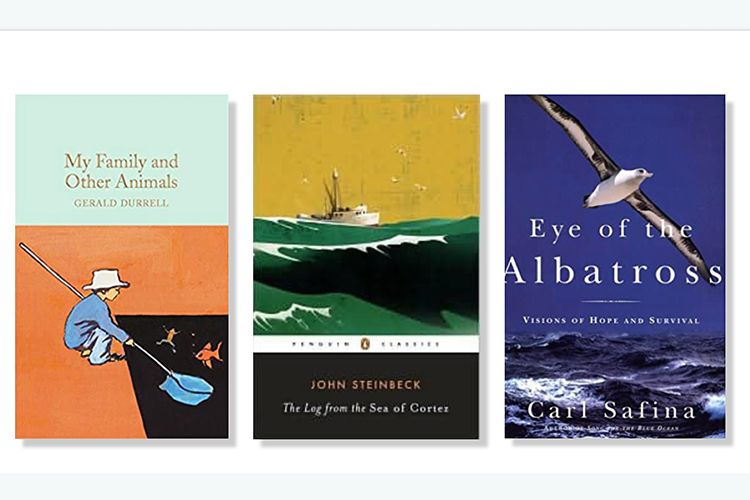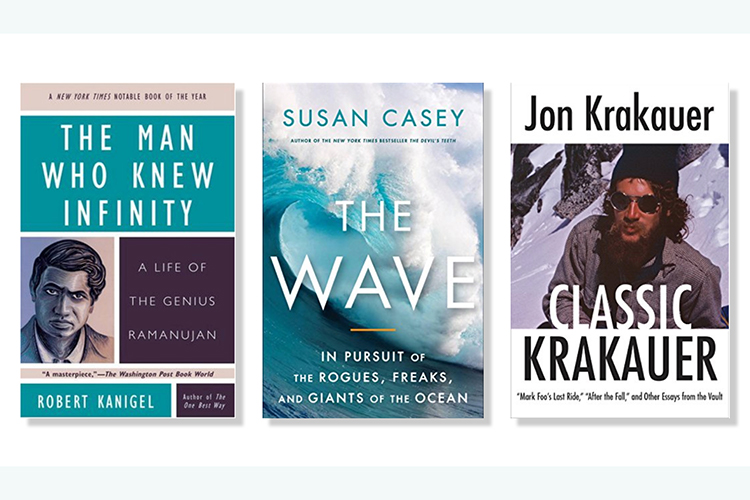Book Recommendations from the Apex Team
Posted by Carmin Arnot
in Of Interest
Shakespeare wrote “Sweet are the uses of adversity…Which, like the toad, ugly and venomous…Wears yet a precious jewel in his head.” …one of his more peculiar lines, actually. But one of the uses of adversity in our present situation is that a lot of us are finding more time to sit and read. In case you’ve almost gone through that pile of books by your bed and are wondering what to read next, we asked our Apex field leaders two questions: “What are you reading now?”, and “What’s your favorite travel or nature book of all time?”. Here is what Peter Harrison and Shirley Metz had to say:
Peter Harrison’s recommendations
I’ve had my head down in a book for these past several months for nearly 12 hours each day. However, despite being in the final editing process of my new book, “Handbook to Seabirds of the World,” I would still like to recommend my all-time favorite books—each of them natural history in nature. If they are not on your own library shelves already, you simply must get copies. I can promise you, with my hand on my heart, that they will also become some of your favorites.
My Family and Other Animals (Corfu Trilogy #1) by Gerald Durrell
Durrell was a leading naturalist and conservationist who also happened to be an amazing storyteller. This book is a semi-autobiographical account of young Durrell’s family life in the 1930’s after moving from dreary and damp England to the sun-drenched Greek Isle of Corfu. The island becomes a child’s paradise where animals are anthropomorphized with creative imagery. Scorpions, bats, butterflies, birds, toads, and more become his menagerie in an idyllic setting of hidden caves and woodlands.
The Log from the Sea of Cortez by John Steinbeck
Steinbeck’s non-fiction book details a six-week nautical expedition to the Sea of Cortez with his friend, marine biologist, Ed Ricketts. Ricketts was to become the inspiration for the character “Doc” in his future novels set in the Monterey area. Hiring a sardine fishing boat, the Western Flyer, Steinbeck and Ricketts traveled the Gulf of California collecting biological specimens. The book is both a biological record and a travel log which documents both men’s philosophies regarding man’s place in the environment. What makes this book of special interest is that the Western Flyer is being restored in Port Townsend, Washington, where Shirley and I live.
Eye of the Albatross by Carl Safina
How could I not enjoy this book which takes you on the wings of an albatross who Safina calls “Amelia?” Safina’s literary detail is compelling and he is undoubtedly one of the best authors of nature I have ever read. As Amelia soars above the Pacific seas in search of food for herself and her chick, she encounters environmental tragedies committed by humans in terms of pollution and over-fishing. Within his detailed narrative of Amelia’s far-flung flights, Safina weaves the stories of whalers and explorers who share their past experiences with whales, penguins, seabirds, sea turtles, and other marine animals. Safina chronicles the steps that humans are taking to help rather than harm them. Be prepared for a good cry.
Shirley Metz’s recommendations
I rarely have time for leisurely reading but when I do, I usually read 2 books at the same time. Whether it’s because I’m so used to multi-tasking, I’m not sure, but what I do know is that I pretty much prefer non-fiction material or at least stories based on facts and history. My choices tend to be geographical, historical, or adventurous and as far afield as the stories will take me. If you haven’t read any of the following yet, run to your library or keyboard to order them; I’ll be waiting for your own reviews.
The Man Who Knew Infinity: A life of the genius Ramanujan by Robert Kanigel
What are the chances that two lives of such disparate social stature—one an ill-educated mathematical genius in India and the other a Cambridge University professor, G.H. Hardy—would meet in the years before World War II to turn the world of mathematics upside down? The numbers theories and papers which evolved from Srinivasa Ramanujan’s brilliance, aided by the tutoring and mentoring of Harding, makes for a fascinating biography. But for Harding’s determination to see the young man succeed against the odds of academies’ short-sightedness, the world would have never learned of Ramanujan’s beautiful numerical ideas. This book reinforces the power of passion, tenacity, stubbornness, and belief in humanity.
The Wave by Susan Casey
Having grown up in ‘the islands’ as a surfer and sailor combined with my interest in oceanography at the University of Hawaii, added to which I’ve spent a great deal of my life at sea, Casey’s adrenalin-pumping book on how big and rogue waves are formed was the perfect read. Her thrilling book took me to many of the places that I have traveled through and re-introduced me to some of my crazy friends who seek monster waves, some in excess of 100 feet! This is also the story of the health of the oceans and the planet, outlining climatic influences to produce “rogue” waves far away from any coastline.
Classic Krakauer by Jon Krakauer
My first Jon Krakauer read was in Outside Magazine which chronicled the 1996 Everest climbing disaster in his gripping account, “Into Thin Air.” Immediately after reading the riveting article, I told Peter to put down his paint brushes, thrust the magazine into his hand and suggested he read this ‘tell all’ account that portrayed the fine line between adventure and tragedy. As guides and expedition leaders, we knew that once you establish a ‘cut-off’ point, you don’t push the limits, or you run the risk of endangering lives. This is exactly what killed the experienced guides along with their guests that year on Everest. We were to meet Jon at Vinson Massif basecamp in Antarctica the following year while leading our Emperor Penguin camping expedition. Jon was then, as he is now, one of the best tellers of adventure and misadventure tales. His current book brings together many of his original essays, proving his relentless search for truth and his love of wild places.



Very pleased to see the suggestions! – some familiar, some new. I’m especially happy that Gerald Durrell’s work is more available now than it was a few years ago.
Most independent bookstores have web sites and are very happy to take orders and ship books (no need to patronize Amazon….)
I’m glad Shirley has highlighted Kanigel’s book on Ramanujan, a very good book about an extraordinary episode. This book is a good read accessible to non-mathematicians, but of course it is about mathematics so one has to lean in that direction. For those with some math, Hardy’s twelve lectures, published under the title Ramanujan, offer a technical overview. The first lecture is a good summary but the succeeding lectures get fairly deep.
Wave is one of my favorite books and Susan Casey one of my favorite authors. Shirley, my cousin Tory’s nephew Brett Lickle is in the book having sustained a serious injury after towing Laird Hamilton onto a monster wave. Hamilton saves his life in dramatic fashion. All the best and stay safe, Chuck